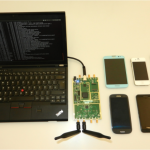
 A transmission electron microscopy image of a bunch of bacteriophages. (credit: ZEISS Microscopy/Flickr ) In the microbial metropolises that thrive in and on the human body, underground networks of viruses loom large. A closer look at human skin has found that it’s teeming with viruses, most of which don’t target us but infect the microbes that live there. Almost 95 percent of those skin-dwelling virus communities are unclassified, researchers report in mBio . Those unknown viruses may prune, manipulate, and hide out in the skin’s bacterial communities, which in turn can make the difference between human health and disease. The finding highlights how much scientists still have to learn about the microscopic affairs that steer human welfare. Past attempts to unmask the viruses on the human body have been hindered by technical difficulties. Viral genomes are much smaller than those of bacteria, making them hard to identify and sift from contamination. In the new study, researchers at the University of Pennsylvania used an advanced method to specifically isolate the DNA of virus-like particles from skin swabs. The researchers also screened viral DNA found on swabs that never touched human skin, allowing them to quickly identify and toss contaminating viruses from their analysis. Read 5 remaining paragraphs | Comments
A transmission electron microscopy image of a bunch of bacteriophages. (credit: ZEISS Microscopy/Flickr ) In the microbial metropolises that thrive in and on the human body, underground networks of viruses loom large. A closer look at human skin has found that it’s teeming with viruses, most of which don’t target us but infect the microbes that live there. Almost 95 percent of those skin-dwelling virus communities are unclassified, researchers report in mBio . Those unknown viruses may prune, manipulate, and hide out in the skin’s bacterial communities, which in turn can make the difference between human health and disease. The finding highlights how much scientists still have to learn about the microscopic affairs that steer human welfare. Past attempts to unmask the viruses on the human body have been hindered by technical difficulties. Viral genomes are much smaller than those of bacteria, making them hard to identify and sift from contamination. In the new study, researchers at the University of Pennsylvania used an advanced method to specifically isolate the DNA of virus-like particles from skin swabs. The researchers also screened viral DNA found on swabs that never touched human skin, allowing them to quickly identify and toss contaminating viruses from their analysis. Read 5 remaining paragraphs | Comments
Read More:
Vast, uncharted viral world discovered on human skin








